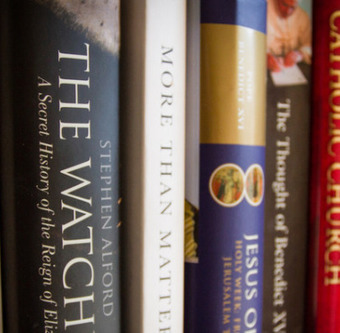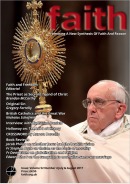
Book Reviews - Making Gay Okay: How Rationalizing Homosexual Behavior is Changing Everything
A totalitarian campaign
Making Gay Okay: How Rationalizing Homosexual Behavior is Changing Everything by Robert Reilly, Ignatius Press, 250pp, £13.39.
reviewed by Edward Short
In this deeply researched and adroitly argued book, Robert Reilly shows the extent to which the normalization of homosexuality has deep roots in philosophical debates that go back centuries. If Aristotle insisted not only on the objectivity of truth but on the ability of the intellect of man to apprehend it, the French philosophe Jacques Rousseau denied this objectivity by ushering in what Cardinal Ratzinger called the ‘tyranny of relativism,’ which gives the rationalization of homosexuality so much of its philosophical underpinning by arguing that natural law is merely a human construct and, as such, susceptible of subjective definition.
Aristotle vs. Rousseau
These two starkly opposing views of natural law define the debate over ‘same-sex marriage.’ For Aristotle, the family is what Reilly nicely calls the “primary and irreducible element of society.” A man and a woman are necessary to the family because their union is procreative, and their procreation leads to children, which lead to households, which lead to villages, which lead to the polis. As Reilly observes, summarizing Aristotle’s understanding of marriage, “the family is the prepolitical institution. The state does not make marriage possible, marriage makes the state possible.” And for Aristotle, ‘same-sex marriage’ would be an absurdity because no state can be founded or sustained on its inescapably barren relations. For Rousseau, by contrast, the family is a corrupt, artificial outcrop of a corrupt, artificial social order, which cries out for reform, and the only entity that can reform it properly is the state. Therefore, Rousseau insisted, the right of educating children must be taken away from the father and mother of the family and given instead to the state. And in this, as Mr. Reilly rightly appreciates, the French philosophe drew up “the prototype for all future revolutionaries” by eliminating the family so that the state could remake the individual directly into whatever new mould the state dictates.
Rationalizing vice
In summing up the moral of Rousseau’s attack on the natural law, Reilly shows how essential it is both to the rationalization of homosexuality and its tyrannical ramifications:
If the family is artificial in its origins, as Rousseau claimed, then it can be changed and rearranged in any way the state or others may desire. Any such change is simply a shift in convention (as there is no teleological Nature), a change in a cultural artifact. We can revise human relations in any way we choose. Whoever has sufficient power may make these alterations to suit himself. There is no standard in Nature to which we must adhere or by which we can be judged. This, of course, includes marriage. If we do not have a Telos, then there could not possibly be a problem with homosexual acts or same-sex marriage—or with many other things as well.
In fine, “Since things do not have ends in themselves, they can be given purposes by whoever is powerful enough to assign them.” As Reilly shows, this is the philosophy of Callicles, who, in Plato’s Georgias, has no hesitation in asserting that “luxury and licentiousness and self-indulgence, if they have the support of force, are virtue and happiness…” As for the “unnatural covenants of mankind,” the good Sophist in Callicles was categorical: they were all “mere stuff and nonsense.” Thus, virtue and vice have no objective meaning; instead, the powerful define them as they please. In this nominalist world, which is now our own world, reason is deployed not to ascertain what virtue and vice truly are, in accordance with the objective natural law, but to rationalize the definitions of vice and virtue that the powerful define, irrespective of the natural law.
The ‘telos’ of marriage
In defending traditional marriage, Reilly shows how marriage is necessarily a union between a man and a woman because its telos is both unitive and generative. And he neatly epitomizes this by stating that “Only a unitive sexual act can be generative and only a generative sexual act can be unitive.” Since homosexual acts by their very nature are neither unitive nor generative, but masturbatory, they can have nothing to do with marriage.
The admission on the part of many homosexuals themselves that they have no interest in what they regard as the bourgeois oppressiveness of monogamy exposes the imposture of ‘same-sex marriage.’ Nevertheless, for the antinomians leading the charge for normalizing homosexuality, the legal redefinition of marriage has always been vital for their purposes because it helps them gain access to children, the non plus ultra of their campaign of indoctrination.
Hazardous to children
While it is true that the homosexual lobby brilliantly bullied the psychiatric profession into abjuring their long-standing assessment of homsexuality as a mental illness, the psychological and moral scars that children suffer by being made privy to the corrupting influence of homosexuals masquerading as parents have been amply documented. The American College of Pediatricians, for example, states that it “believes it is inappropriate, potentially hazardous to children, and dangerously irresponsible to change the age-old prohibition on same-sex parenting, whether by adoption, foster care, or reproductive manipulation. This position is rooted in the best available science.”
Autonomy run amok
The majority opinion in Obergefell v. Hodges, the Supreme Court case which legalized same sex marriage in the U.S., was written by Justice Anthony Kennedy, and it is suffused with the incoherence and sentimentality typical of our progressive elites. Kennedy is the same justice who gave out in Planned Parenthood v. Casey (1992) that “At the heart of liberty, is the right to define one’s own concept of existence, of meaning, of the universe, and of the mystery of human life.” Reilly’s gloss on this stunning statement goes to the marrow of why he opposes the rationalization of homosexuality: here, “Liberty does not mean freedom to choose what is right; it means becoming the source of what is right. It means not conforming oneself to what is good, but making up one’s own good.” It is autonomy run amok.
The truth of human love
Kennedy’s judgment was a far cry from the words of the great legal scholar William Blackstone, who referred to sodomy in his magisterial Commentaries (1769) as “an offence so dark in nature, the very mention of which is a disgrace to human nature, a crime not fit to be named.” Justice Warren Berger’s opinion in Bowers v. Hardwick (1986) will also encourage readers to fight the rationalization of sin as it needs to be fought with brave, unwavering adherence to the truth of human love and human sexuality:
Decisions of individuals relating to homosexual conduct have been subject to state intervention throughout the history of Western civilization. Condemnation of those practices is firmly rooted in Judeo-Christian moral and ethical standards.… To hold that the act of homosexual sodomy is somehow protected as a fundamental right would be to cast aside millennia of moral teaching.
That Reilly includes both these quotes from Blackstone and Berger shows the necessary historical context in which he has placed his exposure of the huge deceit implicit in the totalitarian campaign to normalize homosexuality. Making Gay Okay is a welcome plea for the inviolability of objective truth. A brilliant, courageous, indispensable book, it should be read by all who wish to advance the culture of love—true love, not the article peddled by the homosexual lobby and their legion dupes.
Notes:
Edward Short is the author, most recently, of Adventures in the Book Pages: Essays and Reviews, published by Gracewing.

